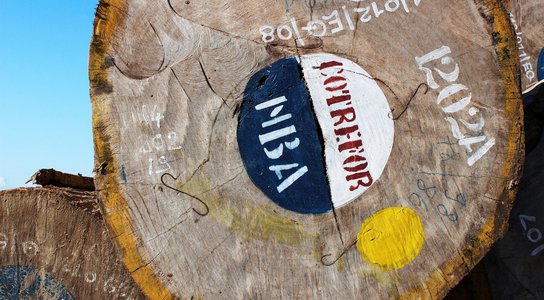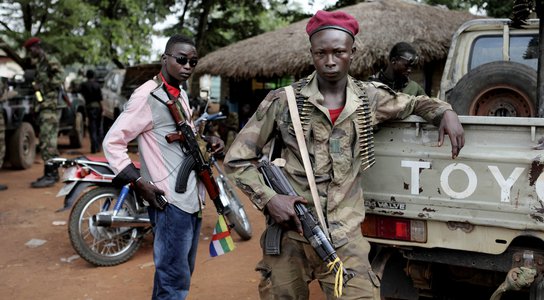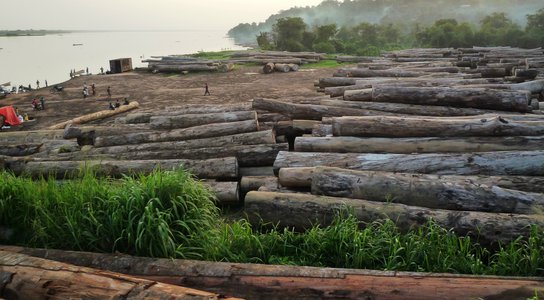Companies dealing with DRC logging giant Cotrefor risk prosecution for breaking sanctions and trading illegal timber.
US consumers of luxury flooring, decking and furniture may be lining the pockets of businessmen accused of financing Hezbollah and illegally logging vast areas of pristine rainforest in the Democratic Republic of Congo (DRC), says a new Global Witness investigation. (1)
Unsanctioned Trade reveals that since 2010, US traders have purchased timber worth over $5.5 million from Cotrefor, the biggest exporter of rainforest timber from DRC. Evidence obtained by Global Witness indicates that the company is owned by a conglomerate that is controlled by members of the Lebanese Tajideen family. These individuals are named on a US sanctions list for alleged links to Hezbollah, which is listed by the US as a foreign terrorist organisation. (2)
In the DRC, Cotrefor stands accused of systematically logging far beyond legal limits, dodging taxes and subjecting workers to conditions akin to modern-day slavery. Its activities are devastating the world’s second largest rainforest, threatening the communities and unique wildlife that live in it. The revelations point to a serious failure by US companies to carry out checks on their suppliers and keep illegal timber off the market, as required by US law.
"Each year hundreds of tons of Cotrefor timber flows into US markets. By failing to intercept it, US companies are allowing consumers to unwittingly finance a company that's linked to a terrorist organisation. This same company is also pillaging the natural wealth of one of the world’s poorest countries and destroying a rainforest of critical global significance,” said a Global Witness spokesperson, whose identity has been protected for security purposes.
Shipping records show how Cotrefor timber has entered the US through the ports of Wilmington, Baltimore and Savannah. Buyers have included East Teak Fine Hardwoods, J. Gibson Mcllvan, Inter Continental Hardwoods and AHC Craig Imports. Global Witness warns that company executives could face prosecution by the US Treasury for sanctions-busting, or penalties under the Lacey Act for importing illegal timber into the US.
As previous Global Witness exposés have shown, all DRC timber should be considered high risk. A culture of back-door deals, bribes and kickbacks ensures that logging companies can break forest protection laws without fear of punishment, while a small club of politicians and businessmen get rich from selling illegal timber overseas. Meanwhile public services like roads, hospitals and schools languish in disrepair, and much of the population lives in grinding poverty.
Cotrefor appears a driving force of this looting machine. Officially it presides over a logging zone that is larger than the US state of Delaware, but with little government oversight the company is widely alleged to raze forest far beyond these borders. This is destroying a huge carbon sink, and one of our best weapons in the fight against climate change, at a time of unprecedented global warming. It is also dismantling a source of food, shelter and livelihoods for the 40 million people who live in the DRC’s rainforest, as well as a vital habitat for endangered species like the bonobo ape, which is one of man’s closest relatives and only found in the DRC.
“The Democratic Republic of Congo’s vast shadow economy is reliant on companies that export illegal timber, consumers who buy it, and governments that look the other way,” said Global Witness.
Global Witness is calling for US timber traders and retailers to urgently break all ties with Cotrefor and review their supply chains. The US authorities must meanwhile investigate Cotrefor and any suspected breaches of US law linked to the company’s imports.
/ENDS
For full report and interviews please contact:
NOTES TO EDITORS:
(1) These sanctions listings make any US company trading with Congo Futur, its subsidiaries, or companies owned or controlled by the listed Tajideen brothers a breach of Executive Order 13224. This targets terrorists, those providing support to terrorists, or acts of terrorism by freezing any assets the designees have under U.S. jurisdiction and prohibiting US persons from engaging in any transactions with them.
(2) Unsanctioned Trade reveals how Cotrefor once traded under another name, Trans-M, which was controlled by Ahmed Tajideen and was a subsidiary of the Congo Futur conglomerate, accused by the US government of raising funds for Hezbollah.
In 2010 the US Treasury placed Congo Futur on a targeted sanctions list, saying that it was part of a network of businesses that had generated millions of dollars in funding for Hezbollah and was owned or controlled by Tajideen's three brothers, Ali, Husayn and Kassim, who were also US sanctions-listed as ‘specially designated global terrorists’.
Just four months after Congo Futur’s sanctions listing, Trans-M changed its name to Cotrefor and Ahmed Tajideen was removed from its list of shareholders in an apparent attempt to disguise the company’s links to the Tajideen family. However, a report published by the Congolese Ministry of Trade in 2013 listed Cotrefor as a subsidiary of the Congo Futur group.
The company also continues to trade out of Congo Futur’s offices in Kinshasa at the address specified on the US sanctions list, and its international traders and clients are almost identical to those of Trans-M, including in the US.
/ ENDS
You might also like
-
Report US consumers at risk of funding Hezbollah
Companies dealing with logging giant Cotrefor risk prosecution for breaking sanctions
-
Report Blood Timber
How Europe played a significant role in funding war in the Central African Republic.
-
Report Exporting Impunity
European and US company executives could face fines and even jail time for trading with Congolese logging companies accused of systematic illegal logging and social and environmental abuses, our exposé warns.